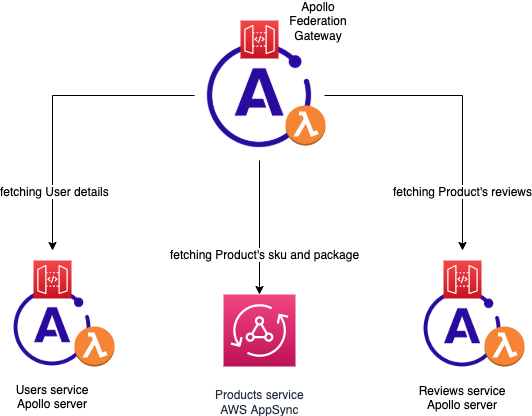Front-End Web & Mobile
Tag: graphql
AWS SAM now supports GraphQL Applications with AWS AppSync
We are pleased to announce that AWS Serverless Application Model (AWS SAM) now supports building serverless GraphQL APIs with AWS AppSync. AWS SAM provides a short-hand syntax for defining AWS serverless resources. AWS AppSync enables developers to connect their applications to data and events with secure, serverless, and performant GraphQL and Pub/Sub APIs. GraphQL APIs […]
Apollo GraphQL Federation with AWS AppSync
This article was written by Florian Chazal, Senior Specialist Solutions Architect, AWS Update (August 2022): This blog post has been updated to comply with the new Apollo Federation spec v2.0. If you are migrating from v1 check the official documentation. Apollo Federation is an architecture and specification used to build and connect multiple distributed backend […]
AWS AppSync now supports projection expressions in DynamoDB resolvers
AWS AppSync is a fully managed service that makes it easy to create and manage GraphQL and real-time APIs. Now, AWS AppSync API developers who use DynamoDB data sources can define projection expressions in their DynamoDB resolvers. Before today, DynamoDB resolvers for AWS AppSync APIs would retrieve all the attributes from a DynamoDB table. Now, […]
Branch Insurance improves hiring diversity and accelerates app development using AWS AppSync
Branch Insurance is an insurance technology startup that provides simple insurance policies and comprehensive bundles to customers in the United States. The company set out to radically simplify the end-user experience for insurance customers by offering bindable prices based on just a couple simple pieces of information – the customer’s name and address. One of Branch’s […]
AWS AppSync pipeline resolvers and functions now support additional array methods and arrow functions
AWS AppSync is a managed service that makes it easy to build scalable APIs that connect applications to data. Developers use AppSync every day to build GraphQL APIs that interact with data sources like Amazon DynamoDB, AWS Lambda, and HTTP APIs. With AppSync, developers can write their resolvers using JavaScript, and run their code on […]
Announcing new GraphQL API features in Amplify Studio
Today, AWS Amplify is announcing support for GraphQL APIs without Conflict Resolution enabled! With this launch, it’s easier than ever to use custom mutations and queries, without needing to manage the underlying conflict resolution protocol. You can still model your data with the same easy-to-use graphical interface. And, we are also bringing improved GraphQL API […]
Secure AWS AppSync with Amazon Cognito using the AWS CDK
In a previous post, we explored how a public API Key for AWS AppSync provides a simple way of allowing access to resources, however, it does come with the following tradeoffs: Expiring after a certain amount of time. The key is passed on the x-api-key header of the request. Making it easy for bad actors […]
Secure AWS AppSync with API Keys using the AWS CDK
AWS AppSync is a managed GraphQL service offered by AWS. As a managed service, there are no servers to keep track of and scaling up and down due to traffic is automatically handled by AWS. In AppSync, there is no concept of a fully-public API. Every request must be protected by one of the following: […]
7 ways to reduce latency in your AWS AppSync API
Overview AWS AppSync is a serverless GraphQL service that makes it easy to create single endpoint GraphQL and realtime APIs. AppSync lets you combine disparate data sources and deliver the results to applications in an expected format, as specified by your API’s schema definition. As with any GraphQL service, there are mechanisms in place to […]
Building a full-stack chat application with AWS and NextJS
June 27, 2024: This blog post covers Amplify Gen 1. For new Amplify apps, we recommend using Amplify Gen 2. You can learn more about Gen 2 in our launch blog post. Modern chat apps require a rich set of features. These features include file storage, real-time updates, and the ability to fetch data on both the […]









